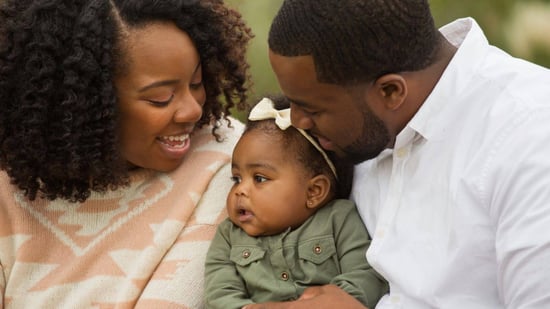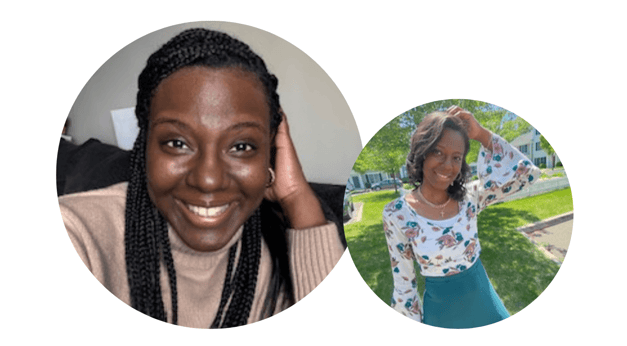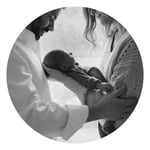Why Aren't There More Black Egg Donors? Bridging the Diversity Gap
February 16th, 2024 | 8 min. read

All too often, Black women experiencing infertility who need the help of an egg or sperm donor soon face another barrier to building their family - a lack of diversity in available donors. A three-time egg donor shares her experience in the hopes that it encourages other women of color to consider donating too.
In this article:

Meet Brooke
Born and raised in Stamford, Connecticut, Brooke has always been known to those around her as a calm, gentle, and kind spirit. Growing up in such a diverse area meant that she was able to experience many different cultures, cuisines, and languages from a young age - something she feels grateful for.
Once she graduated high school, Brooke traveled south for college. After obtaining her bachelors and masters degrees, she was led to her current career as a paraprofessional, working with children with special needs and autism. "I love what I do," Brooke says.
Her Personal Mission
"My son, who is five, has encouraged me to do so much, as he is a child with special needs himself," she adds. Now on her way to pursuing a teaching degree in special education, Brooke feels passionate about not only helping other children, but her own son as well.
In addition to her professional work, she has felt led to help families in another life-changing way: egg donation.
Why She Became an Egg Donor
Brooke says she first learned about egg donation through an advertisement - and also happened to work right next door to one of Illume Fertility's offices. After personally experiencing the joy of motherhood, the concept of donating her eggs to help another individual or couple build their own family intrigued her, so she investigated further.
In addition, Brooke has also worked closely with underserved women throughout her career - many of whom were not able to carry children. "I began to understand, more and more, that I wanted to be able to give back to families in a way that would put them at ease and bring them joy," she says.
As a woman of color, she also wants to raise awareness and urge others to consider donating, with the goal of promoting diversity in the donor conception space.
Her Experience as an Egg Donor
After speaking with the team at Illume Fertility and signing on to join the in-house egg donor program, Brooke knew she'd made the right choice. She has since undergone three separate egg donation cycles at Illume, all of which she describes as "smooth sailing."
"I’ve been working with Illume for quite some time now, and the one thing that kept me here was their team - they always deliver," Brooke says. "From the front desk to the surgical team, everyone was very open and friendly and always had my best interest at heart; I will forever be appreciative of them."
If you're someone considering becoming an egg donor, Brooke offers some reassuring words: "As you begin to think about and explore your options, just know that you’ll be in great hands [at Illume]," she says.
What it's like to be a first-time donor:
An egg donation cycle is made up of three parts: medical and psychological screening, hormonal injections to stimulate the ovaries, and finally, a minor surgical procedure called an egg retrieval.
During her first egg donation cycle, Brooke says she felt nervous that she was doing everything wrong. From injecting follicle-stimulating hormones at home to worrying if she was progressing well during morning monitoring ultrasounds, it was a big undertaking!
As time went on, Brooke gained confidence, eventually feeling like she was a total pro: "Every night I spent injecting myself led me to believe I was an honorary nurse!"
On her interactions with intended parents:
Brooke has experienced both open and anonymous donations, with her first and third donation being anonymous. "I understood the [intended parents'] choice of wanting to keep that part to themselves," she says.
"My second donation was open, and that was such a beautiful experience," Brooke shares. "I got to meet the intended parents and learn not only how appreciative they were to be going through this, but also how excited they were for the opportunity."
Note: With DNA testing becoming increasingly accessible, no donor is truly "anonymous" anymore. That's one reason why counseling is such an important part of the process for both intended parents and donors, and why parents are encouraged to talk about their child's donor with them from a young age.
Brooke's Advice to Prospective Egg Donors
After undergoing three egg donation cycles, Brooke has gained wisdom about the process that she hopes to share with other women considering becoming an egg donor.
- Do it for the right reasons: "Make sure your heart is in it and take into consideration that it’s truly not about the money," Brooke says.
- Make sure you're committed: "This process is something you have to really want to devote yourself to," she advises.
- Understand your impact: "Be mindful that you as an individual have the potential to help people start and build their families," Brooke urges.
As for her own journey, Brooke is hoping to add to her family soon. She is also working on getting her teaching degree, with the intention of giving back to her community and working with children with autism and special needs.
Racial & Ethnic Diversity in Donor Pools
In addition to helping individual families grow through egg donation, Brooke wants to raise awareness of the lack of racial and ethnic diversity amongst donors and encourage other women of color to consider becoming donors themselves.
"There really isn’t much diversity within the egg donor space," she says. "And I believe that changing this is imperative - there are so many families out there who want their future children to look like and be a representation of them."
With donors of color being so scarce, options for intended parents are incredibly limited. This can lead to a variety of additional barriers to family building, particularly if the biological intended parent has a genetic disorder or other specific criteria to consider.
Because Black women experience infertility at nearly twice the rate of their white counterparts, the demand for Black egg donors is even higher.
Why aren't there more Black donors?
The answer, as you might expect, is complex. Here are a few possible reasons:
- Black women may feel wary of interacting with the medical system, due to America's storied history of abuse, mistreatment and exploitation when it comes to people of color.
- Some may also anticipate judgment or harsh criticism from family members, who might not understand why they want to donate their eggs.
- Recruitment efforts and advertising campaigns by fertility clinics and cryobanks are also often met with related associations, prompting negative responses (or none at all).
- There is a severe lack of representation when it comes to people of color in the fertility space.
This has unfortunately led to a very low number of applicants, narrowing donor databases and causing a major shortage of Black donors for intended parents to choose from.
A Quick Look at Donor Diversity
As of February 2024, California Cryobank had 155 Caucasian sperm donors listed (327 donors total), yet only 14 donors in their database identified as Black/African American. That means intended parents specifically searching for a Black donor would only see 4% of the cryobank's database.
Egg Donor USA's database is considerably smaller, but only 15% of the listed donors identify as Black/African American (out of 301 total). After applying additional filters (such as blood type and whether the donor is willing to disclose their identity), that pool of 46 Black egg donors shrinks to only two.
With such a small selection to choose from, intended parents are often forced to consider donors outside their own ethnicity. And while some may be open to this concept, many still hope to find a donor who shares similar characteristics.
"There are so many families in search of donors who look like them, and I can only imagine the disappointment that sets in when they discover how few options they have - if any," Brooke says. "That's why I believe that increasing diversity amongst donors is critical."
The Impact of Egg Donation
After her experience as an egg donor, Brooke has learned just how powerful it is to make this decision and help other people become parents: "This is a beautiful thing for many families," she says.
She also wants other prospective donors and intended parents to know that it is okay to be nervous: "Just know that you are valued and needed, no matter what role you play," she says. "And if you're a woman of color, think about helping a family grow - you’ll never understand how rewarding it is until you go through the process."
By opening up about her own journey, she hopes to demystify egg donation for other Black women willing to give the ultimate gift. "I’m so blessed to have been able to help three families [through egg donation]," Brooke adds. "If I could, I would absolutely do it again!"
Sierra Dehmler is Illume Fertility’s Content Marketing Manager. She combines her personal experience as a fertility patient with decades of expertise in marketing and content strategy to create accessible resources. Her mission is to empower and educate patients by breaking down complex information and helping them feel supported throughout their family-building journey.


